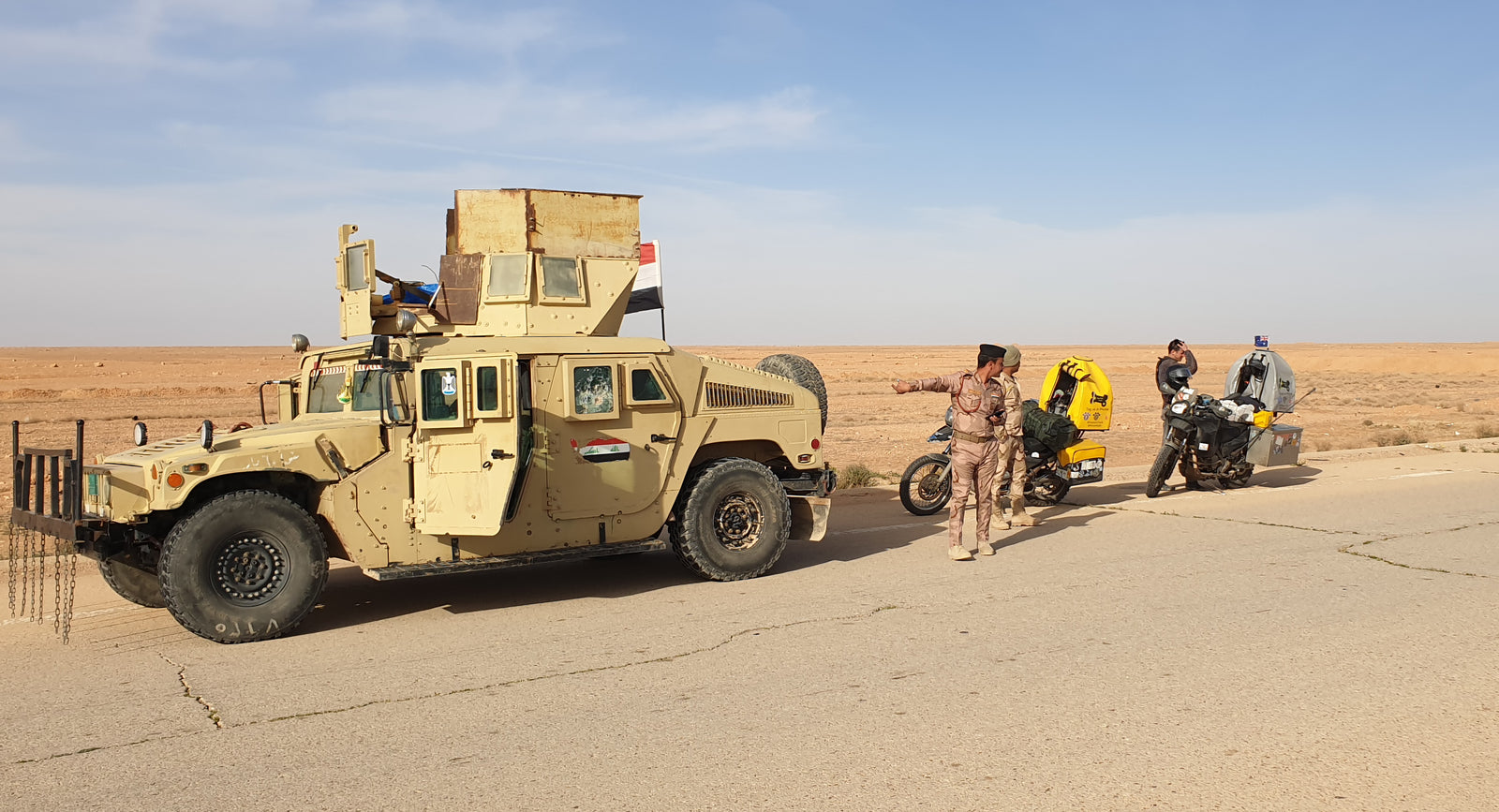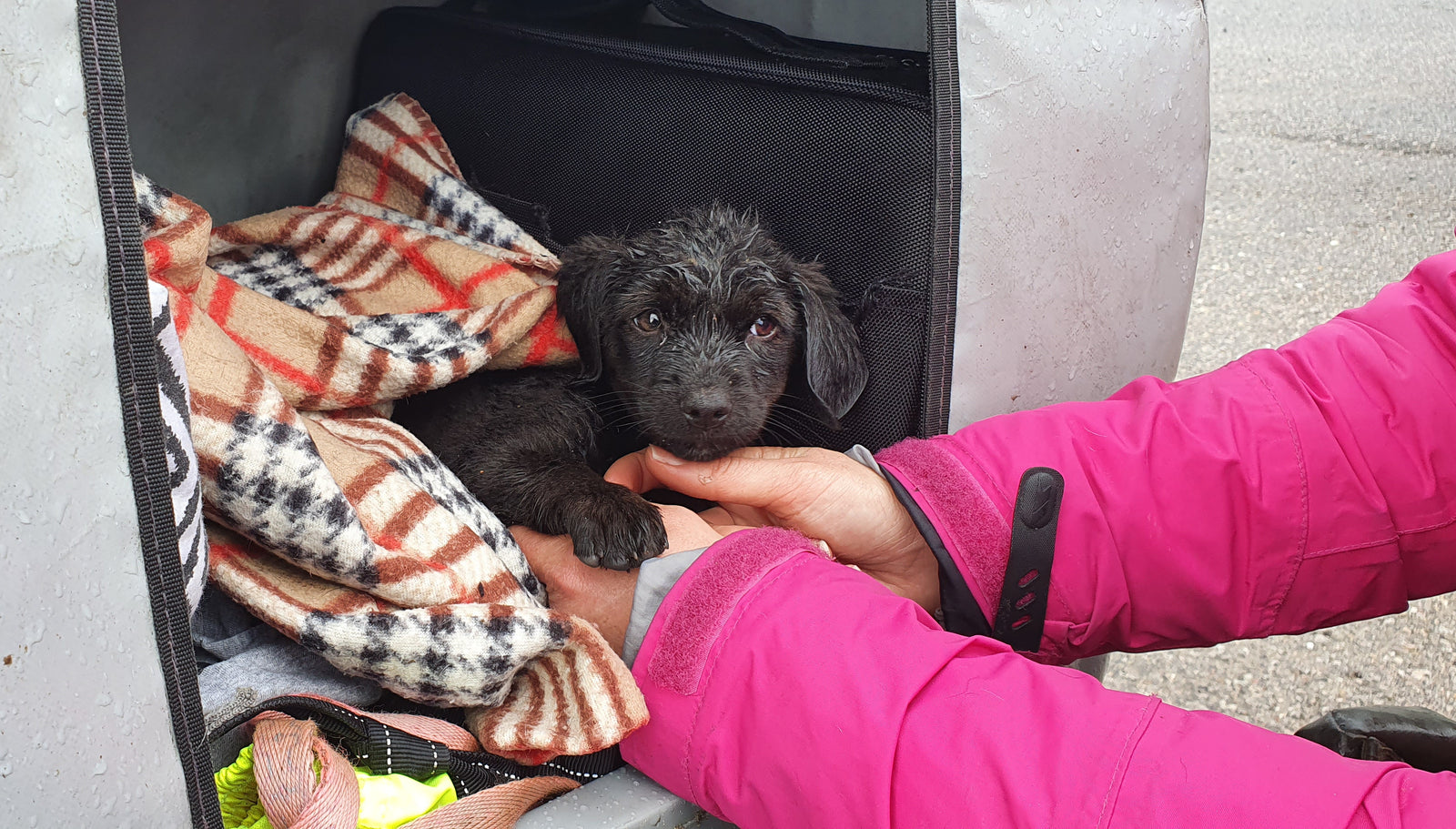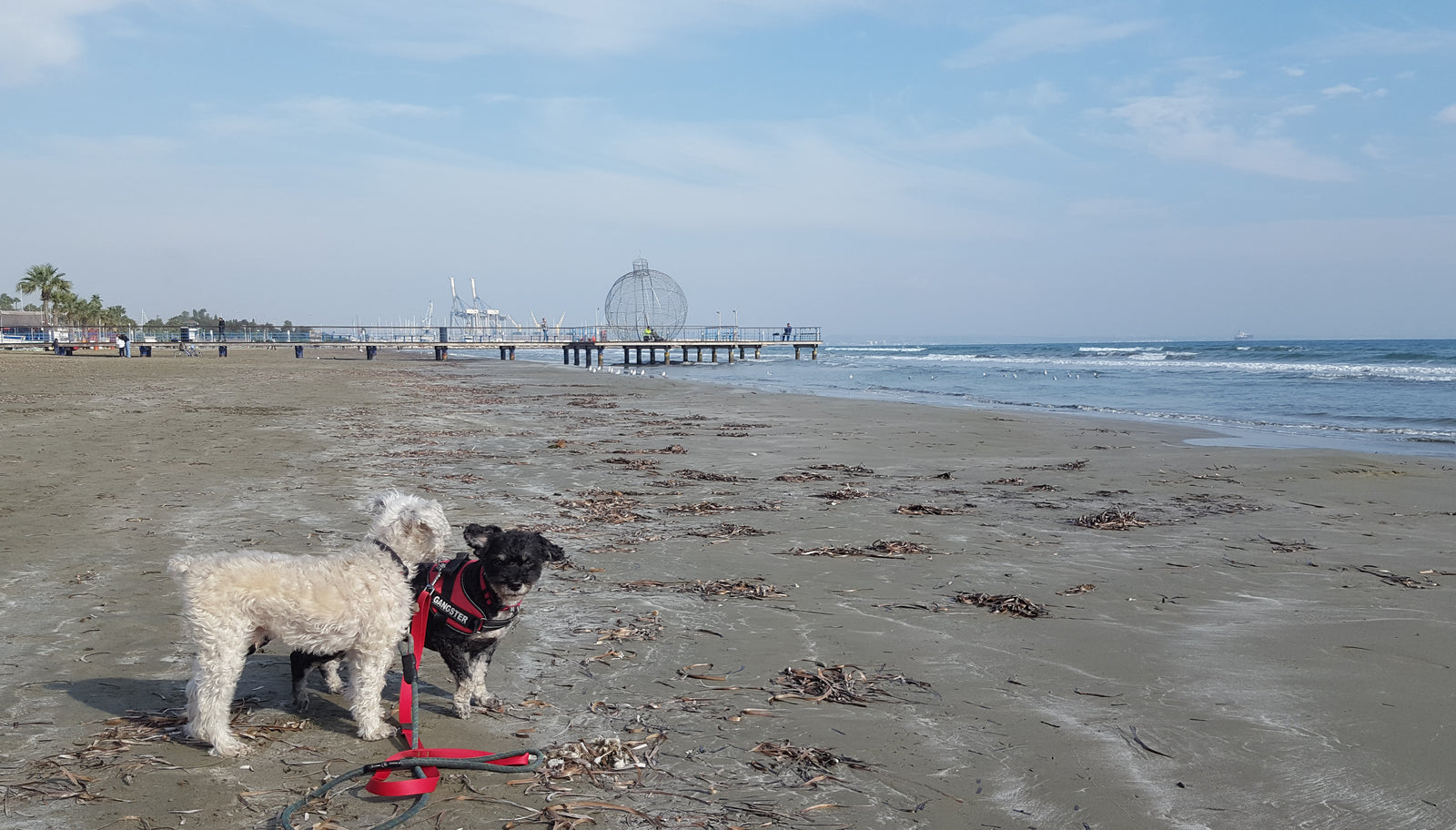Senegal and Mali
February 09, 2017
Told in the collective first person, jointly from Stu and Janell Clarke's perspective.
Narrated Audio Blog
Mauritania to Senegal was another difficult border crossing. We chose the sleepy border crossing of Diama instead of the more popular Rosso border crossing. The road to Diama takes you through a national park. Its a dirt road, heavily corrugated, but fun to ride. There are plenty of warthogs to see and local birds. We lost a few screws, shaken loose from the corrugations, and Janell broke a fuel line about 15km from the Senegal border. She only realised because the fuel was pouring on to her foot and it got really cold and stopped to investigate.
The broken fuel line had to be addressed asap. The rocks from the gravel road were flicking up and had cracked the plastic connection for the Touratech auxiliary tank. We've had this part damaged before so its no surprise and we were carrying one spare connector which we simply fitted on the spot. To protect the connector however we grabbed an empty 500mL coke bottle, chopped the end off and fed the line through the bottle to act as a protective casing. We couldn't afford for another break right now with no more spare parts and the loss of quite a bit of fuel.

The repairs delayed us a bit and we pulled into Diama just as the last light was fading. The Mauritania border was closed and with nothing for miles, the officers let us set up our tent in front of the customs and immigration (Douane) office. Despite the unknown loss of fuel Janell still pulled in to the border without her fuel light on. Stu with 2L less capacity was close to empty with possibly 20km in his tank.
The next morning we packed up the bikes before first light so as not to block the bridge when the border did open. When the sun did rise we noticed something very concerning. Under Janell's bike was a puddle. We did the old sniff test and confirmed it was fuel, not the worst thing in the world but certainly a pain at this point. We couldn't transfer fuel from Stu's bike because he only had what was in the main tank and that wasn't going to be enough, maybe not even enough to get to the nearest fuel station which our GPS suggested was 20km away. We decided we'd get the border crossing done and then sort out our fuel issue.
The officials on both sides were indeed corrupt as we'd been advised, they asked for €10 per motorbike for the export from Mauritania and then €10 per motorbike to import in to Senegal. We simply refused to pay and on cue, they refused to stamp our passports. Same old same old. We got our camping chair out and waited. It took a few hours in Mauritania but they got sick of us and pushed us through. No bribes paid. We pushed Janell's motorbike over the bridge between the two countries and checked in to Senegal. There is a legitimate 5,000CFA import permit, which we paid but not the bribe. The key is to wait, if it's not legit they will give in and send you on your way, they would rather get rid of you than have you hanging around potentially 'corrupting' other travellers with the truth about what to pay.
Really really tired and hungry now, perhaps a little frustrated, we found someone to get us some fuel while we had an egg roll and coffee at the only restaurant around. Feeling a little more human, we rode the 30km to St Louis where we spent the next 2 relaxing nights staying with Fanny from Airbnb and her husband. A really lovely experience and interesting city.
Dakar, the capital, was our next destination in Senegal. We were hoping to visit friends and organise our Visa for Mali. In 2012 Stu deployed to South Sudan for a 6 month UN mission and worked with Souleymane from the Senegal Army. Souleymane was not in Dakar but his family invited us to stay with them. The only place we could stay however was on the roof with the goats. It was rather exciting camping on the roof, we had plenty of privacy and benefited from the cool breeze at night.
Souleymane's beautiful wife Nafe and his brother-in-law Almamy took care of us, ensuring we enjoyed our stay in Dakar, felt at home and were well fed. We spent a bit of time with their three children but unfortunately couldn't converse with them in French. Children don't seem to mind, they just carry on and somehow the rules to the games become evident soon enough.
Obtaining the Mali visa was fairly hassle free and reasonably priced. At the Embassy (GPS Coordinates 14.687647, -17.470214) the staff will provide an A4 form to complete which includes details of accommodation in Mali and attach 2 passport photos. We then paid 25,000 CFA per person (UK passport) for a 25 day single entry. We collected our passports the next day.
We really didn't want to leave Senegal without seeing Souleymane himself. He was based in the south near Kolda, extremist militants keeping him busy in the bush. We decided to ride around the Gambia to avoid a border crossing and the cost of a visa. The roads were pretty good and it was nice to see more of the country. Souleyman was happy to see Stu again, they had a lot to catch up on. We stayed two nights then had to let him get back to work and we made our way to Mali.
We crossed from Senegal to Mali at the Moussala/Koundame border crossing just before sunset. It was a straightforward and quick border crossing. We had obtained visas for Mali when we were in Dakar so the Senegal Police stamped our passports out and then the Mali Police stamped us in. No fixers and no money involved. We were travelling without a Carnet de Passage so at the borders we had to ascertain if a Temporary Import Permit (TIP) was required to bring the motorbikes into each country, but for Mali there wasn't one which made things a lot faster. And still nobody had asked for any documents for the dogs which we suppose is not really surprising. We were of course prepared with our EU Pet Passports that clearly documented their vaccinations.
Our first night in Mali didn't go to plan and we camped at a petrol station after trying to find accomodation in the small, rural town of Kéniébani, Kayes, but getting nowhere for one reason or another. It was very dark, our GPS had stopped working and we needed to make our way back to the main road and the safety of street lights and moving traffic. The roads were hilly and challenging with deep ruts and water erosion and many roads ending abruptly from flooding creeks. In the dark it seemed to be one seamless shanty town. We felt vulnerable trying to navigate our way through the narrow corridors and Stuart tried to keep moving for safety reasons. At one point he just lost it with Janell for not keeping up. She was tired, worried and struggling with the challenging roads. Not the safest situation to be in and no time for stopping to assess the road but also not a time to get angry. We eventually made it out of the maze with the assistance of a local man who directed us back to the main road. The petrol station was well lit and on the main road so we decided it was the safest place to set up for the night. Riding at night can be so dangerous for so many reasons and we try very hard to avoid it if possible. But if things don't go to plan due to breakdowns or poor roads or arduous border crossings then we end up in these situations. But inevitably there are kind people to help guide us, people who are facing such difficulties and poverty in their countries.
The scenery changed quickly as we rode further into Mali. These gorgeous hills appeared and vegetation became greener (who'd have thought from a land locked Saharan nation). We were headed for the capital, Bamako. It was 550km from Kayes and Janell was in for some bike problems that would make it two very long and tiring days ride.
Over the Sena comms Janell was trying to explain a problem with her motorbike to Stu. It didn't seem to be firing properly on its single cylinder. We pulled over and pulled it apart. After a lot of trouble shooting we identified a problem with one of the ignition coils. The F650GS is a single cylinder engine but has two spark plugs. This is the first time we were able to appreciate the advantage of this set up. During a fall in Morocco, Janell's battery acid and split down through the bike and it was now obvious it had damaged quite a few parts, including one of the ignition coils that was zapping Stu when he touched it (earthing issue). By unplugging that ignition coil we were able to continue on to Bamako without that issue reoccurring.
The second problem to pop up later that day was a broken clutch cable. Fortunately it broke just as we rode into a small town. People in small towns are so clever, a team of locals took her clutch cable and fabricated a replacement from local parts. It wasn't perfect and would need replacing soon but again, the solution got us on the road and into Bamako. While the fabrication was taking place with Stu in tow, Janell was left to mind the motorbikes and the dogs and was swamped by curious children. They are so cheeky and sometimes overwhelming with their questions and their hands. But seeing children smile all around the world is one of the treasures of travelling this way. They took turns sitting on the bikes, laughing at the dogs and poking Janell.
The last breakdown of the day happened 2km from our campsite in Bamako. It was 8pm and the motorbike died. More trouble shooting with no luck until Stu remembered reading about two yellow solenoids. The advice was that if you ever had a starting problem just to swap them around because one isn't as important as the other for starting the motorbike. They weren't easy to get to but we swapped them around and it seemed to do the trick. The motorbike started and we were able to ride the final two exhausting kilometres to The Sleeping Camel.
The Sleeping Camel is the best place to stay in Bamako (in our opinion). It's sort of a hostel/hotel with a restaurant and bar set up in a very secure compound. UN and NGO staff stay here when they are in transit or having time off from the mission in the North of Mali. Overlanders are able to camp in the grounds which is what we did. One very unique feature of The Sleeping Camel is the pet rabbits that hop around but it adds to the friendliness of the place. They also organise things like quiz nights, movie nights, river cruises and other tourist activities. The quiz nights were fun and where we got to know one of our good friends Paul from the UK. Paul introduced us to a Whatsapp group he had started in West Africa to stay in touch and get info from other overland travellers. It was so simple but so useful. A perfect example of technology connecting like minded people.
We discovered the Hash House Harriers at The Sleeping Camel after chatting to some American's working at the US Embassy. It was famously described to us as "a drinking club with a running problem." There were about 20 people that day, we started and finished at a ladies house nearby who kindly let us leave Weeti and Shadow in the air conditioning while we followed markers on route to a few bars. We got chatting to a lovely young man from the US who was in Africa finding his roots, he had ancestry from Western Africa but also Ethiopia which was evident in his ease of running. Anyway, we certainly had fun, got some exercise and enjoyed a few beers.
Mali is bordered by 7 countries and 8 others within close proximity so the capital Bamako is a convenient place to organise visas for West African countries down to Nigeria. At least this was the case while we were in Bamako and may have changed since then. We organised visas for Benin, Burkina Faso and Nigeria.
Janell needed a few parts for her bike, but it wasn't going to be easy to get them in Mali and we'd more or less resigned to the fact that we'd have to limp on. There was one problem we encountered that would need attention before leaving Bamako. Her cooling fan died. We searched around for a similar part, any 12v fan would make do, but the only fan's we could find were far too big or simple computer cooling fans which wouldn't do the job. After days of searching the markets we were put in touch with a local policeman through Andre, a contact in the UN. Andre had a BMW G650X Country, a bike with the same engine as ours. Andre had purchased parts from this police officer in the past.The police bikes in Mali were the F650GS, so presumably this officer would have been stripping one of these bikes for parts. We didn't ask any questions, we just showed him the part we needed and a few hours later he'd reappear with it. He wasn't cheap but always got the part and always genuine BMW. We took this opportunity to repair all the faulty parts on Janell's bike and have it ready again for the ensuing adventures.
We spent well over a week in Bamako and had itchy feet when we left, and itchy arms and legs from the Mosquito's. There were extremists in the North imposing Sharia law and the travel advice was to keep to the south. We confirmed this was correct with UN peacekeepers who had just returned from the region. We had wanted to ride to Timbuktu but this was north of the safe zone so decided to head directly to Burkina Faso where we may have a chance of seeing wild Elephants.
Leave a comment
Comments will be approved before showing up.
Also in Dog Blog

Iraq
March 30, 2022 1 Comment

Turkey & Azra
March 30, 2022

Cyprus
January 12, 2022
Are you a Dog Person?
Do you Love to Ride?
Click below for more information on how you can take your best friend along on your next biking adventure
© 2024 The Pack Track.
Powered by Shopify











